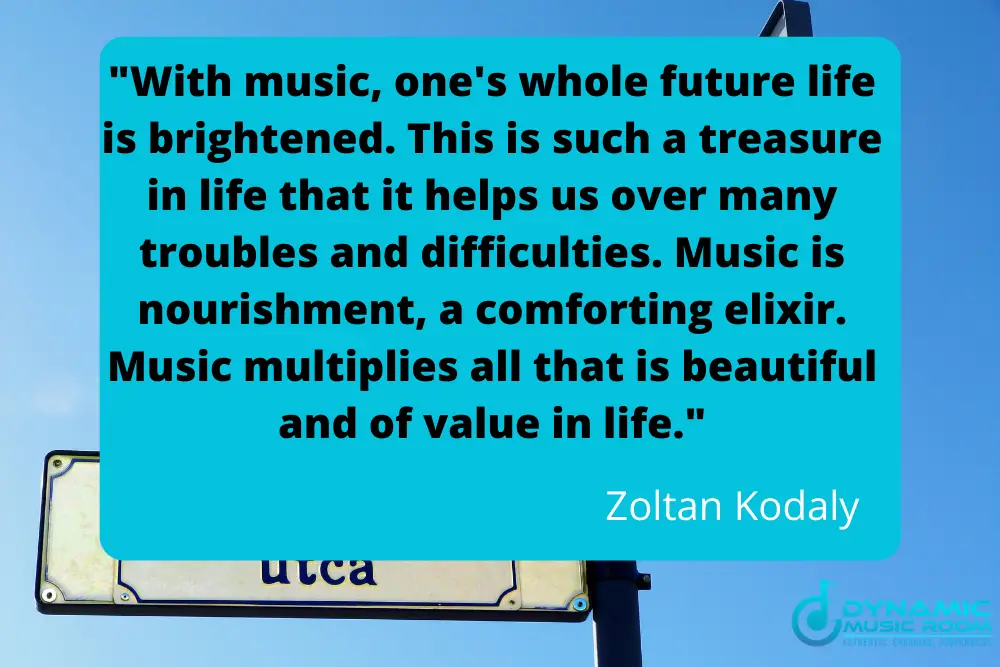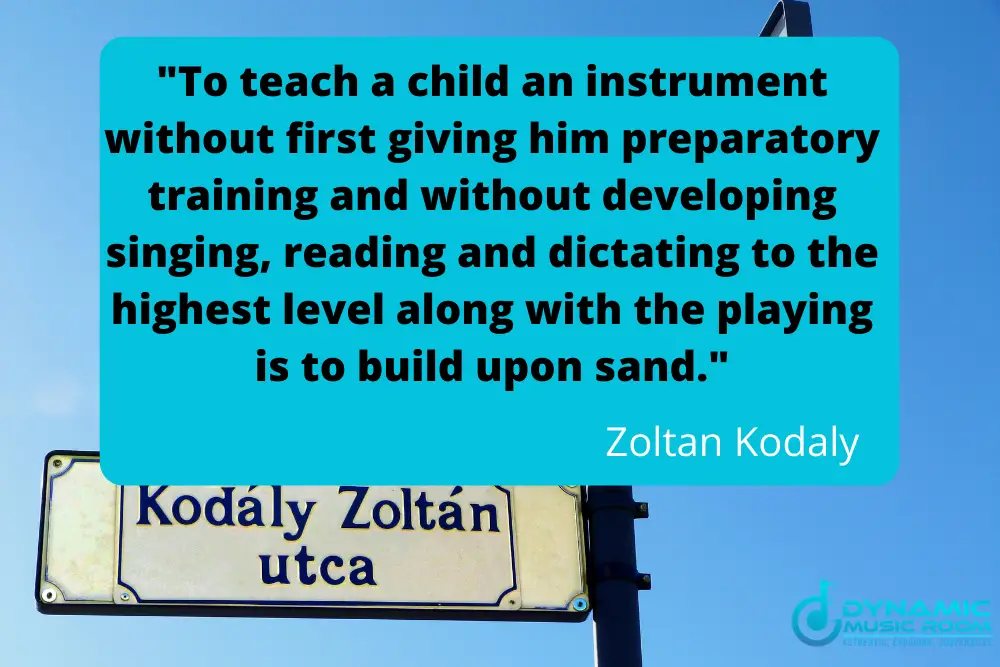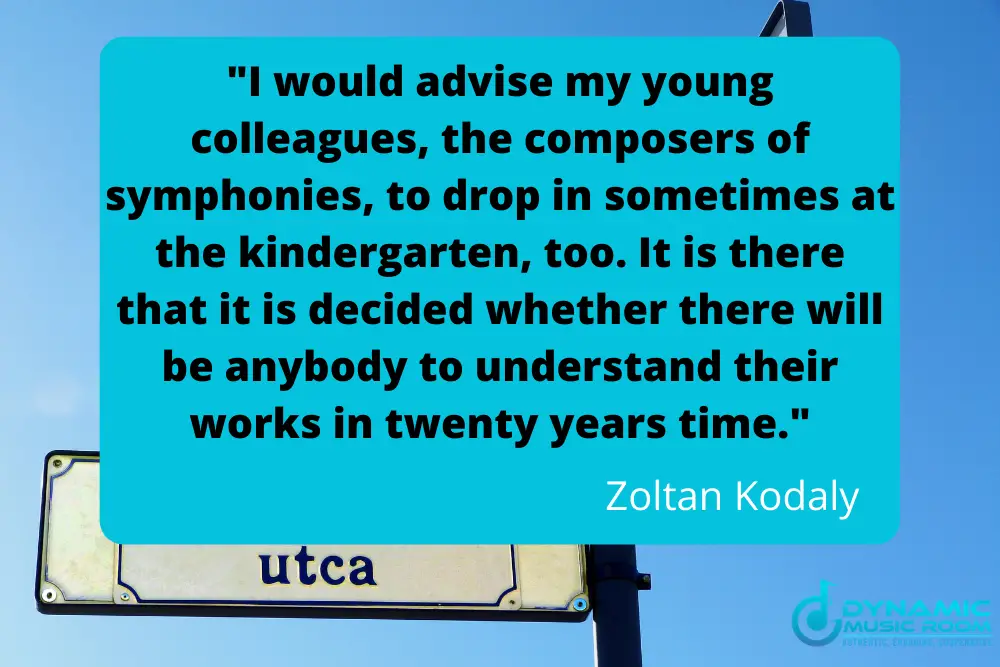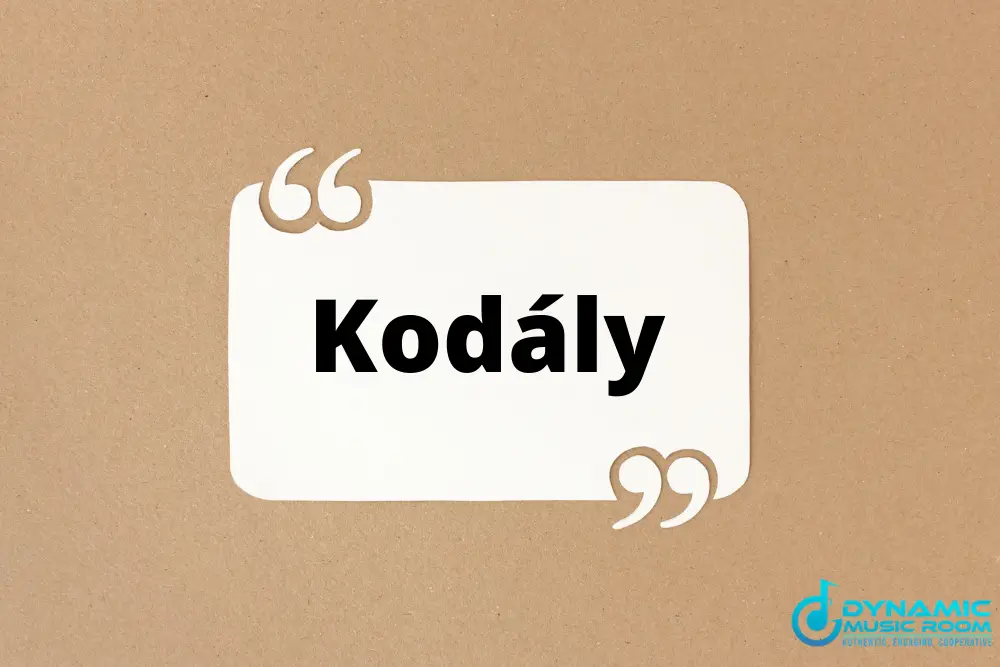Are you looking to learn more about what Zoltán Kodály stood for?
Do you want to be inspired in teaching music?
Teaching music is hard, my friends.
There are some tough things about it, for sure, but it’s also rewarding.
When I’m feeling overwhelmed, one of the things I love to do is look up quotes by inspirational people and music teachers.
These are my favorite Kodály quotes to inspire me to keep providing meaningful musical experiences and develop music literacy.
Table of Contents
Who Was Zoltán Kodály?
Literal volumes have been written on the life of Zoltán Kodály.
I recommend checking them out if you want to learn more.
The International Kodály Society is another great resource.
What follows here is a (very) brief history of Kodály, the man.
Zoltán Kodály was born in Hungary is 1882.
He grew up to become a composer, specifically one known for his choral works even though he was known for his violin and piano playing.
He noticed people weren’t interested in attending concerts where he premiered his pieces.
In general, he found the average person didn’t care for classical music.
After doing research, he discovered the reason to be that music wasn’t being taught in schools.
In fact, the children of Hungary didn’t even know their native folk songs!
Kodály saw this for the big problem it was and sought to fix it.
With the help of his graduate students, they adapted the works of Jeno Adam for Hungarian music and expanded it to form the basis for the Kodály Method today.
Principles of the Kodály method include (just a short list):
- Quality music chosen from the students’ heritage
- Sound before symbol
- Using syllables to teach
- A sequential approach
There is obviously a lot more to be said, but for the purposes of this article, we’ll get to the Kodály quotes.
Top Kodály Quotes
Here are my favorite Kodály quotes.
I hope these inspire you and make you think as much as they make me think.
Some quotes are shared in an image form and as plain text.
If you’d like to share these quotes, please feel free to do so!
All I ask is that you link back to the homepage or this post if you do.
Note: Quotes may end up as misattributed despite my research, if you question the validity of the quote, PLEASE email me at dynamicmusicroomATgmailDOTcom to let me know. Thank you for your help.
Bright Future

With music, one’s whole future life is brightened. This is such a treasure in life that it helps us over many troubles and difficulties. Music is nourishment, a comforting elixir. Music multiplies all that is beautiful and of value in life.
Lifetime Inspiration
Often a single experience will open the young soul to music for a whole lifetime.
A Well-Trained Musician
The characteristics of a good musician can be summarized as follows: 1. A well-trained ear. 2. A well-trained intelligence. 3. A well-trained heart. 4. A well-trained hand. All four must develop together, in constant equilibrium. As soon as one lags behind or rushes ahead, there is something wrong. So far most of you have met only the requirement of the fourth point: the training of your fingers has left the rest far behind. You would have achieved the same results more quickly and easily, however, if your training in the other three had kept pace.
Singing First

To teach a child an instrument without first giving him preparatory training and without developing singing, reading and dictating to the highest level along with the playing is to build upon sand.
Head over to this post on finding Kodály songs for more resources.
Movement And Music
Singing connected with movements and action is a much more ancient, and, at the same time, more complex phenomenon than is a simple song.
Inner Hearing
We should read music in the same way that an educated adult will read a book: in silence, but imagining the sound.
Elementary Education Is Critical For Music

I would advise my young colleagues, the composers of symphonies, to drop in sometimes at the kindergarten, too. It is there that it is decided whether there will be anybody to understand their works in twenty years time.
Music Is Precious To Humanity
Music is a manifestation of the human spirit, similar to language. Its greatest practitioners have conveyed to mankind things not possible to say in any other language. If we do not want these things to remain dead treasures, we must do our utmost to make the greatest possible number of people understand their idiom.
More Kodály Writings
If you enjoyed reading these quotes (like me!), you may also want to check out some of Kodály’s other writings.
They are almost-always inspirational, but sometimes they also get into the practical.
Then again, maybe you just want to learn about the method.
Here are three books you should check out.
Disclaimer: Links may be affiliate in nature, which means we earn a small commission at no extra cost to you. It’s a win-win, so thanks!
The Selected Writings of Zoltán Kodály – This book contains the actual words of Kodály (translated into English).
For those who want to hear from him, I highly recommend this book.
The Kodály Method – This book, written by Lois Choksy, is the perfect explanation of the method and offers many practical ways to apply it.
Even better, it doesn’t get so into detail you need a certification to understand it!
Kodály Today – On the opposite end, Kodály Today is a dense book (get the hardcover; the paperback won’t stay bound for long!).
But it has everything you could possibly need to teach music from a Kodály lens.
Final Thoughts
Wow! I hope you’re as inspired by these Kodály quotes as I am.
For someone who’s initial goal was to get more people to attend his concerts, it’s easy to tell Kodály quickly grew to love and appreciate music for everyone.
From developing true music literacy to preserving the songs of the people, Kodály’s impact on music education was powerful.
You may also want to check out these Kodály method books.

